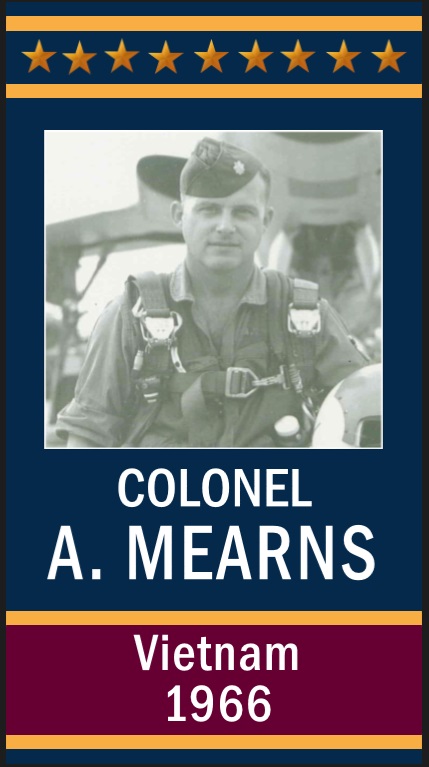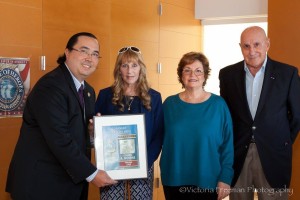
Colonel Arthur S. Mearns (USAF) MIA-KIA
by CDR John Lepore USNR (Ret)
Arthur Mearns was born in Flushing, N.Y. on July 12, 1929. He grew up in Great Neck, Long Island, attending high school there. According to his sister, Betty Maxwell, Arthur never took his studies very seriously at Great Neck High, but did love the Sea Scout program his father, a Commander in the Navy, introduced to him. He also got hooked on airplanes when an uncle, a retired Army Air Force officer, took Art flying in small planes.
Realizing he needed to improve his grades, Arthur went to McBurnie Prep School in New York City. At McBurnie, Art found scholastic success and was accepted at Colgate University in 1948. At Colgate he obtained a Bachelor of Arts degree in languages, and at the same time, 1952, graduated from the Air Force Reserve Officer Training Corps (ROTC) with the rank of Second Lieutenant. Now in the Air Force, Art was selected to fly jet aircraft, taking pilot training and advanced gunnery to become a fighter pilot.
After a tour of duty in South Korea, Art was assigned to Luke Air Force Base in Phoenix, AZ as an advanced instructor. Art’s sister Betty had her roommate and fellow TWA flight hostess, Mary Ann Patterson (Pat), deliver a late Christmas present to her brother. First Lt. Mearns not only received his gift, but as it turned out, his wife! In 1956 Art and Pat were married at Luke AFB.
As Arthur Mearns’ expertise in flying became common knowledge, he was promoted to the rank of Captain in the regular Air Force, and transferred to a F-105 squadron in Japan. The F105 Thunderchief became his aircraft. He and his fellow pilots greatly admired this aircraft nicknamed the “Thud”.
Air Force fighter pilots were at a premium when the Vietnam War broke out in Southeast Asia when Mearns was assigned to temporary duty in Thailand. Now a Major, Mearns was closing in on a hundred combat missions and an automatic return to the United States.
Colonel Jack Broughton, a personal friend and fellow “Thud” pilot, described Arthur Mearns’ last flight over North Vietnam in his book, “Thud Ridge.” On Veterans Day, November 11, 1966, Arthur headed for his target, railroad yards near Hanoi. Most flights were forced to turn back due to adverse weather, but Arthur felt his flight could accomplish the mission, so he continued on. The clouds opened up enough for him to dive to his target, but the ground fire was intense. After releasing his bombs, his F-105 was badly hit by enemy fire. Art struggled to nurse his aircraft to the South China Sea where Navy and Air Force assets might rescue him, but his plane was coming apart. He ejected safely and his parachute opened, but that was the last anyone saw of Major Art Mearns. He was listed as missing in action (MIA). A few years later he was promoted to Colonel in absentia.
Among his awards, Mearns earned the Silver Star, the Distinguished Flying Cross with two oak leaf clusters, and the Air Medal with three oak leaf clusters. His citation upon receiving the “Silver Star” read, “Major Mearns distinguished himself by gallantry in military operations against the enemy as an F-105 Pilot over North Vietnam on 11 November 1966. On that date Major Mearns led fighter bombers at tree top level to strike a vital railroad yard, Bac Lo, effectively destroying the yard and many of the boxcars. By his gallantry and devotion to duty, Major Mearns has reflected great credit upon himself and the United States Air Force.”
Eventually the remains of Col. Mearns were returned to the United States. On October 28, 1977 his status was changed from MIA to Killed in Action. Two weeks later on Veterans Day, exactly 11 years after his last mission for our country, Col. Mearns was buried with honors at Arlington National Cemetery.
In tribute to Col. Mearns and fellow Air Force pilots who flew multiple missions over North Vietnam, General J.P. McConnell wrote, “No airmen flew more difficult and dangerous missions; nor penetrated more formidable defenses. None ever operated under a tighter set of constraints nor struck more precisely or accurately against defined military targets.”
It is one thing to know your military loved one died or was being held in a prison camp; it is quite another not to know. Left with two children, Frances and Missy, Pat Mearns felt she was in limbo during those years of doubt and uncertainty. She dedicated herself to the exhausting work of trying to help the Red Cross identify those missing in action. Mrs. Mearns traveled often to Washington D.C. to urge congressmen to action, and even traveled to England, the Vatican, Romania, Russia, Laos, Vietnam and India, as well as the Paris Peace Talks to identify the MIAs and to try to ease the lot of our known POWs.

Both Pat Mearns and Col. Mearns’ sister, Betty Maxwell, have resided in Coronado for many years.
Visit more Hero Biographies.




